- Home
- Edith Wharton
The Age of Innocence Page 12
The Age of Innocence Read online
Page 12
XII.
Old-fashioned New York dined at seven, and the habit of after-dinnercalls, though derided in Archer's set, still generally prevailed. Asthe young man strolled up Fifth Avenue from Waverley Place, the longthoroughfare was deserted but for a group of carriages standing beforethe Reggie Chiverses' (where there was a dinner for the Duke), and theoccasional figure of an elderly gentleman in heavy overcoat and mufflerascending a brownstone doorstep and disappearing into a gas-lit hall.Thus, as Archer crossed Washington Square, he remarked that old Mr. duLac was calling on his cousins the Dagonets, and turning down thecorner of West Tenth Street he saw Mr. Skipworth, of his own firm,obviously bound on a visit to the Miss Lannings. A little farther upFifth Avenue, Beaufort appeared on his doorstep, darkly projectedagainst a blaze of light, descended to his private brougham, and rolledaway to a mysterious and probably unmentionable destination. It wasnot an Opera night, and no one was giving a party, so that Beaufort'souting was undoubtedly of a clandestine nature. Archer connected it inhis mind with a little house beyond Lexington Avenue in whichberibboned window curtains and flower-boxes had recently appeared, andbefore whose newly painted door the canary-coloured brougham of MissFanny Ring was frequently seen to wait.
Beyond the small and slippery pyramid which composed Mrs. Archer'sworld lay the almost unmapped quarter inhabited by artists, musiciansand "people who wrote." These scattered fragments of humanity hadnever shown any desire to be amalgamated with the social structure. Inspite of odd ways they were said to be, for the most part, quiterespectable; but they preferred to keep to themselves. Medora Manson,in her prosperous days, had inaugurated a "literary salon"; but it hadsoon died out owing to the reluctance of the literary to frequent it.
Others had made the same attempt, and there was a household ofBlenkers--an intense and voluble mother, and three blowsy daughters whoimitated her--where one met Edwin Booth and Patti and William Winter,and the new Shakespearian actor George Rignold, and some of themagazine editors and musical and literary critics.
Mrs. Archer and her group felt a certain timidity concerning thesepersons. They were odd, they were uncertain, they had things onedidn't know about in the background of their lives and minds.Literature and art were deeply respected in the Archer set, and Mrs.Archer was always at pains to tell her children how much more agreeableand cultivated society had been when it included such figures asWashington Irving, Fitz-Greene Halleck and the poet of "The CulpritFay." The most celebrated authors of that generation had been"gentlemen"; perhaps the unknown persons who succeeded them hadgentlemanly sentiments, but their origin, their appearance, their hair,their intimacy with the stage and the Opera, made any old New Yorkcriterion inapplicable to them.
"When I was a girl," Mrs. Archer used to say, "we knew everybodybetween the Battery and Canal Street; and only the people one knew hadcarriages. It was perfectly easy to place any one then; now one can'ttell, and I prefer not to try."
Only old Catherine Mingott, with her absence of moral prejudices andalmost parvenu indifference to the subtler distinctions, might havebridged the abyss; but she had never opened a book or looked at apicture, and cared for music only because it reminded her of galanights at the Italiens, in the days of her triumph at the Tuileries.Possibly Beaufort, who was her match in daring, would have succeeded inbringing about a fusion; but his grand house and silk-stockingedfootmen were an obstacle to informal sociability. Moreover, he was asilliterate as old Mrs. Mingott, and considered "fellows who wrote" asthe mere paid purveyors of rich men's pleasures; and no one rich enoughto influence his opinion had ever questioned it.
Newland Archer had been aware of these things ever since he couldremember, and had accepted them as part of the structure of hisuniverse. He knew that there were societies where painters and poetsand novelists and men of science, and even great actors, were as soughtafter as Dukes; he had often pictured to himself what it would havebeen to live in the intimacy of drawing-rooms dominated by the talk ofMerimee (whose "Lettres a une Inconnue" was one of his inseparables),of Thackeray, Browning or William Morris. But such things wereinconceivable in New York, and unsettling to think of. Archer knewmost of the "fellows who wrote," the musicians and the painters: he metthem at the Century, or at the little musical and theatrical clubs thatwere beginning to come into existence. He enjoyed them there, and wasbored with them at the Blenkers', where they were mingled with fervidand dowdy women who passed them about like captured curiosities; andeven after his most exciting talks with Ned Winsett he always came awaywith the feeling that if his world was small, so was theirs, and thatthe only way to enlarge either was to reach a stage of manners wherethey would naturally merge.
He was reminded of this by trying to picture the society in which theCountess Olenska had lived and suffered, and also--perhaps--tastedmysterious joys. He remembered with what amusement she had told himthat her grandmother Mingott and the Wellands objected to her living ina "Bohemian" quarter given over to "people who wrote." It was not theperil but the poverty that her family disliked; but that shade escapedher, and she supposed they considered literature compromising.
She herself had no fears of it, and the books scattered about herdrawing-room (a part of the house in which books were usually supposedto be "out of place"), though chiefly works of fiction, had whettedArcher's interest with such new names as those of Paul Bourget,Huysmans, and the Goncourt brothers. Ruminating on these things as heapproached her door, he was once more conscious of the curious way inwhich she reversed his values, and of the need of thinking himself intoconditions incredibly different from any that he knew if he were to beof use in her present difficulty.
Nastasia opened the door, smiling mysteriously. On the bench in thehall lay a sable-lined overcoat, a folded opera hat of dull silk with agold J. B. on the lining, and a white silk muffler: there was nomistaking the fact that these costly articles were the property ofJulius Beaufort.
Archer was angry: so angry that he came near scribbling a word on hiscard and going away; then he remembered that in writing to MadameOlenska he had been kept by excess of discretion from saying that hewished to see her privately. He had therefore no one but himself toblame if she had opened her doors to other visitors; and he entered thedrawing-room with the dogged determination to make Beaufort feelhimself in the way, and to outstay him.
The banker stood leaning against the mantelshelf, which was draped withan old embroidery held in place by brass candelabra containing churchcandles of yellowish wax. He had thrust his chest out, supporting hisshoulders against the mantel and resting his weight on one largepatent-leather foot. As Archer entered he was smiling and looking downon his hostess, who sat on a sofa placed at right angles to thechimney. A table banked with flowers formed a screen behind it, andagainst the orchids and azaleas which the young man recognised astributes from the Beaufort hot-houses, Madame Olenska sathalf-reclined, her head propped on a hand and her wide sleeve leavingthe arm bare to the elbow.
It was usual for ladies who received in the evenings to wear what werecalled "simple dinner dresses": a close-fitting armour of whale-bonedsilk, slightly open in the neck, with lace ruffles filling in thecrack, and tight sleeves with a flounce uncovering just enough wrist toshow an Etruscan gold bracelet or a velvet band. But Madame Olenska,heedless of tradition, was attired in a long robe of red velvetbordered about the chin and down the front with glossy black fur.Archer remembered, on his last visit to Paris, seeing a portrait by thenew painter, Carolus Duran, whose pictures were the sensation of theSalon, in which the lady wore one of these bold sheath-like robes withher chin nestling in fur. There was something perverse and provocativein the notion of fur worn in the evening in a heated drawing-room, andin the combination of a muffled throat and bare arms; but the effectwas undeniably pleasing.
"Lord love us--three whole days at Skuytercliff!" Beaufort was sayingin his loud sneering voice as Archer entered. "You'd better take allyour furs, and a hot-water-bottle."
"Why? Is the
house so cold?" she asked, holding out her left hand toArcher in a way mysteriously suggesting that she expected him to kissit.
"No; but the missus is," said Beaufort, nodding carelessly to the youngman.
"But I thought her so kind. She came herself to invite me. Granny saysI must certainly go."
"Granny would, of course. And I say it's a shame you're going to missthe little oyster supper I'd planned for you at Delmonico's nextSunday, with Campanini and Scalchi and a lot of jolly people."
She looked doubtfully from the banker to Archer.
"Ah--that does tempt me! Except the other evening at Mrs. Struthers'sI've not met a single artist since I've been here."
"What kind of artists? I know one or two painters, very good fellows,that I could bring to see you if you'd allow me," said Archer boldly.
"Painters? Are there painters in New York?" asked Beaufort, in a toneimplying that there could be none since he did not buy their pictures;and Madame Olenska said to Archer, with her grave smile: "That wouldbe charming. But I was really thinking of dramatic artists, singers,actors, musicians. My husband's house was always full of them."
She said the words "my husband" as if no sinister associations wereconnected with them, and in a tone that seemed almost to sigh over thelost delights of her married life. Archer looked at her perplexedly,wondering if it were lightness or dissimulation that enabled her totouch so easily on the past at the very moment when she was risking herreputation in order to break with it.
"I do think," she went on, addressing both men, "that the imprevu addsto one's enjoyment. It's perhaps a mistake to see the same peopleevery day."
"It's confoundedly dull, anyhow; New York is dying of dullness,"Beaufort grumbled. "And when I try to liven it up for you, you go backon me. Come--think better of it! Sunday is your last chance, forCampanini leaves next week for Baltimore and Philadelphia; and I've aprivate room, and a Steinway, and they'll sing all night for me."
"How delicious! May I think it over, and write to you tomorrowmorning?"
She spoke amiably, yet with the least hint of dismissal in her voice.Beaufort evidently felt it, and being unused to dismissals, stoodstaring at her with an obstinate line between his eyes.
"Why not now?"
"It's too serious a question to decide at this late hour."
"Do you call it late?"
She returned his glance coolly. "Yes; because I have still to talkbusiness with Mr. Archer for a little while."
"Ah," Beaufort snapped. There was no appeal from her tone, and with aslight shrug he recovered his composure, took her hand, which he kissedwith a practised air, and calling out from the threshold: "I say,Newland, if you can persuade the Countess to stop in town of courseyou're included in the supper," left the room with his heavy importantstep.
For a moment Archer fancied that Mr. Letterblair must have told her ofhis coming; but the irrelevance of her next remark made him change hismind.
"You know painters, then? You live in their milieu?" she asked, hereyes full of interest.
"Oh, not exactly. I don't know that the arts have a milieu here, anyof them; they're more like a very thinly settled outskirt."
"But you care for such things?"
"Immensely. When I'm in Paris or London I never miss an exhibition. Itry to keep up."
She looked down at the tip of the little satin boot that peeped fromher long draperies.
"I used to care immensely too: my life was full of such things. Butnow I want to try not to."
"You want to try not to?"
"Yes: I want to cast off all my old life, to become just like everybodyelse here."
Archer reddened. "You'll never be like everybody else," he said.
She raised her straight eyebrows a little. "Ah, don't say that. Ifyou knew how I hate to be different!"
Her face had grown as sombre as a tragic mask. She leaned forward,clasping her knee in her thin hands, and looking away from him intoremote dark distances.
"I want to get away from it all," she insisted.
He waited a moment and cleared his throat. "I know. Mr. Letterblairhas told me."
"Ah?"
"That's the reason I've come. He asked me to--you see I'm in the firm."
She looked slightly surprised, and then her eyes brightened. "You meanyou can manage it for me? I can talk to you instead of Mr.Letterblair? Oh, that will be so much easier!"
Her tone touched him, and his confidence grew with hisself-satisfaction. He perceived that she had spoken of business toBeaufort simply to get rid of him; and to have routed Beaufort wassomething of a triumph.
"I am here to talk about it," he repeated.
She sat silent, her head still propped by the arm that rested on theback of the sofa. Her face looked pale and extinguished, as if dimmedby the rich red of her dress. She struck Archer, of a sudden, as apathetic and even pitiful figure.
"Now we're coming to hard facts," he thought, conscious in himself ofthe same instinctive recoil that he had so often criticised in hismother and her contemporaries. How little practice he had had indealing with unusual situations! Their very vocabulary was unfamiliarto him, and seemed to belong to fiction and the stage. In face of whatwas coming he felt as awkward and embarrassed as a boy.
After a pause Madame Olenska broke out with unexpected vehemence: "Iwant to be free; I want to wipe out all the past."
"I understand that."
Her face warmed. "Then you'll help me?"
"First--" he hesitated--"perhaps I ought to know a little more."
She seemed surprised. "You know about my husband--my life with him?"
He made a sign of assent.
"Well--then--what more is there? In this country are such thingstolerated? I'm a Protestant--our church does not forbid divorce insuch cases."
"Certainly not."
They were both silent again, and Archer felt the spectre of CountOlenski's letter grimacing hideously between them. The letter filledonly half a page, and was just what he had described it to be inspeaking of it to Mr. Letterblair: the vague charge of an angryblackguard. But how much truth was behind it? Only Count Olenski'swife could tell.
"I've looked through the papers you gave to Mr. Letterblair," he saidat length.
"Well--can there be anything more abominable?"
"No."
She changed her position slightly, screening her eyes with her liftedhand.
"Of course you know," Archer continued, "that if your husband choosesto fight the case--as he threatens to--"
"Yes--?"
"He can say things--things that might be unpl--might be disagreeable toyou: say them publicly, so that they would get about, and harm you evenif--"
"If--?"
"I mean: no matter how unfounded they were."
She paused for a long interval; so long that, not wishing to keep hiseyes on her shaded face, he had time to imprint on his mind the exactshape of her other hand, the one on her knee, and every detail of thethree rings on her fourth and fifth fingers; among which, he noticed, awedding ring did not appear.
"What harm could such accusations, even if he made them publicly, do mehere?"
It was on his lips to exclaim: "My poor child--far more harm thananywhere else!" Instead, he answered, in a voice that sounded in hisears like Mr. Letterblair's: "New York society is a very small worldcompared with the one you've lived in. And it's ruled, in spite ofappearances, by a few people with--well, rather old-fashioned ideas."
She said nothing, and he continued: "Our ideas about marriage anddivorce are particularly old-fashioned. Our legislation favoursdivorce--our social customs don't."
"Never?"
"Well--not if the woman, however injured, however irreproachable, hasappearances in the least degree against her, has exposed herself by anyunconventional action to--to offensive insinuations--"
She drooped her head a little lower, and he waited again, intenselyhoping for a flash of indignation, or a
t least a brief cry of denial.None came.
A little travelling clock ticked purringly at her elbow, and a logbroke in two and sent up a shower of sparks. The whole hushed andbrooding room seemed to be waiting silently with Archer.
"Yes," she murmured at length, "that's what my family tell me."
He winced a little. "It's not unnatural--"
"OUR family," she corrected herself; and Archer coloured. "For you'llbe my cousin soon," she continued gently.
"I hope so."
"And you take their view?"
He stood up at this, wandered across the room, stared with void eyes atone of the pictures against the old red damask, and came backirresolutely to her side. How could he say: "Yes, if what yourhusband hints is true, or if you've no way of disproving it?"
"Sincerely--" she interjected, as he was about to speak.
He looked down into the fire. "Sincerely, then--what should you gainthat would compensate for the possibility--the certainty--of a lot ofbeastly talk?"
"But my freedom--is that nothing?"
It flashed across him at that instant that the charge in the letter wastrue, and that she hoped to marry the partner of her guilt. How was heto tell her that, if she really cherished such a plan, the laws of theState were inexorably opposed to it? The mere suspicion that thethought was in her mind made him feel harshly and impatiently towardher. "But aren't you as free as air as it is?" he returned. "Who cantouch you? Mr. Letterblair tells me the financial question has beensettled--"
"Oh, yes," she said indifferently.
"Well, then: is it worth while to risk what may be infinitelydisagreeable and painful? Think of the newspapers--their vileness!It's all stupid and narrow and unjust--but one can't make over society."
"No," she acquiesced; and her tone was so faint and desolate that hefelt a sudden remorse for his own hard thoughts.
"The individual, in such cases, is nearly always sacrificed to what issupposed to be the collective interest: people cling to any conventionthat keeps the family together--protects the children, if there areany," he rambled on, pouring out all the stock phrases that rose to hislips in his intense desire to cover over the ugly reality which hersilence seemed to have laid bare. Since she would not or could not saythe one word that would have cleared the air, his wish was not to lether feel that he was trying to probe into her secret. Better keep onthe surface, in the prudent old New York way, than risk uncovering awound he could not heal.
"It's my business, you know," he went on, "to help you to see thesethings as the people who are fondest of you see them. The Mingotts,the Wellands, the van der Luydens, all your friends and relations: if Ididn't show you honestly how they judge such questions, it wouldn't befair of me, would it?" He spoke insistently, almost pleading with herin his eagerness to cover up that yawning silence.
She said slowly: "No; it wouldn't be fair."
The fire had crumbled down to greyness, and one of the lamps made agurgling appeal for attention. Madame Olenska rose, wound it up andreturned to the fire, but without resuming her seat.
Her remaining on her feet seemed to signify that there was nothing morefor either of them to say, and Archer stood up also.
"Very well; I will do what you wish," she said abruptly. The bloodrushed to his forehead; and, taken aback by the suddenness of hersurrender, he caught her two hands awkwardly in his.
"I--I do want to help you," he said.
"You do help me. Good night, my cousin."
He bent and laid his lips on her hands, which were cold and lifeless.She drew them away, and he turned to the door, found his coat and hatunder the faint gas-light of the hall, and plunged out into the winternight bursting with the belated eloquence of the inarticulate.

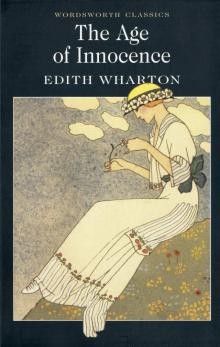 The Age of Innocence
The Age of Innocence The Reef
The Reef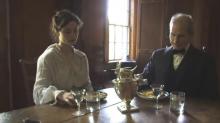 Summer
Summer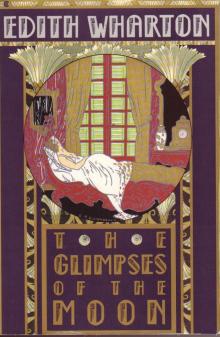 The Glimpses of the Moon
The Glimpses of the Moon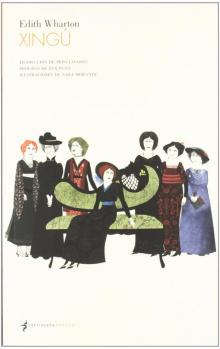 Xingu
Xingu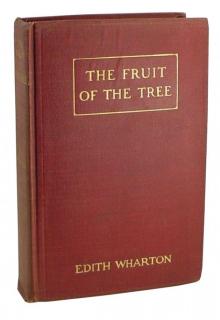 The Fruit of the Tree
The Fruit of the Tree Fast and Loose
Fast and Loose Artemis to Actaeon and Other Verse
Artemis to Actaeon and Other Verse The Line of Least Resistance
The Line of Least Resistance The Lamp of Psyche
The Lamp of Psyche The Reckoning
The Reckoning Afterward
Afterward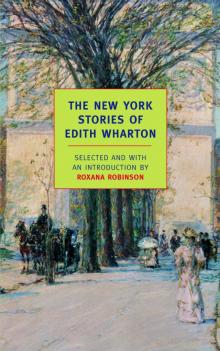 The New York Stories of Edith Wharton
The New York Stories of Edith Wharton The 2014 Halloween Horrors Megapack
The 2014 Halloween Horrors Megapack 'Copy': A Dialogue
'Copy': A Dialogue The Recovery
The Recovery The Fulness of Life
The Fulness of Life Early Short Stories Vol. 1
Early Short Stories Vol. 1 Tales of Men and Ghosts
Tales of Men and Ghosts The House of the Dead Hand
The House of the Dead Hand That Good May Come
That Good May Come The Buccaneers
The Buccaneers Other Times, Other Manners
Other Times, Other Manners The Hermit and the Wild Woman
The Hermit and the Wild Woman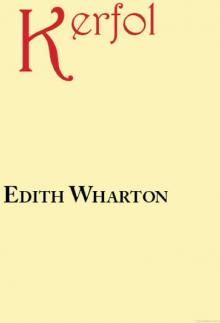 Kerfol
Kerfol The Duchess at Prayer
The Duchess at Prayer Bunner Sisters
Bunner Sisters The Choice
The Choice Madame De Treymes
Madame De Treymes Ethan Frome, Summer, Bunner Sisters
Ethan Frome, Summer, Bunner Sisters In Morocco
In Morocco The Valley of Decision
The Valley of Decision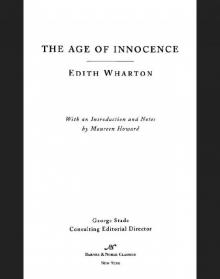 Age of Innocence (Barnes & Noble Classics Series)
Age of Innocence (Barnes & Noble Classics Series) The Angel at the Grave
The Angel at the Grave April Showers
April Showers Sanctuary
Sanctuary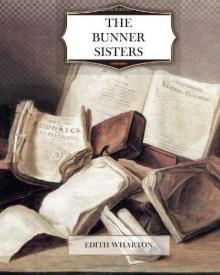 The Bunner Sisters
The Bunner Sisters Mrs. Manstey's View
Mrs. Manstey's View Writing a War Story
Writing a War Story The Custom of the Country
The Custom of the Country In Trust
In Trust The Triumph of the Night
The Triumph of the Night The Hermit and the Wild Woman, and Other Stories
The Hermit and the Wild Woman, and Other Stories Roman Fever and Other Stories
Roman Fever and Other Stories The Mission of Jane
The Mission of Jane The Descent of Man and Other Stories
The Descent of Man and Other Stories Coming Home
Coming Home The Touchstone
The Touchstone Early Short Stories Vol. 2
Early Short Stories Vol. 2 Edith Wharton's Verse, 1879-1919, from various journals.
Edith Wharton's Verse, 1879-1919, from various journals.